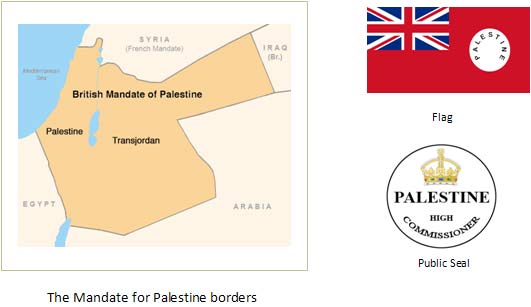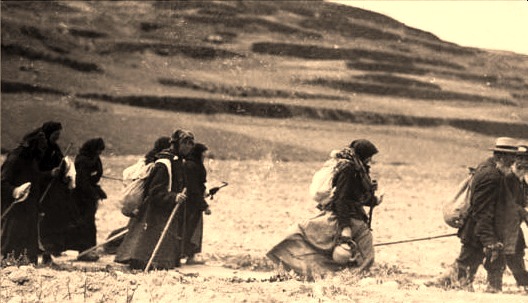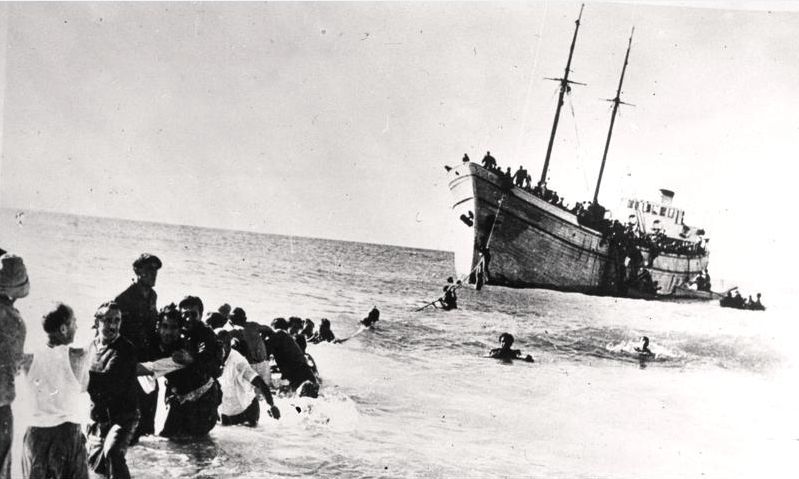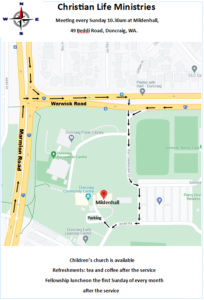Aliyah
For generations of religious Jews, aliyah was associated with the coming of the Jewish Messiah. Jews prayed for their Messiah to come, who was to redeem the land of Israel from gentile rule and return world Jewry to the land under a theocratic government where “God himself is recognized as the head” of the state. Many Religious Jews espouse aliyah as a return to the Promised land, and regard it as the fulfillment of God’s biblical promise to the descendants of the Hebrew patriarchs Abraham, Isaac, and Jacob.
Many Religious Jews espouse aliyah as a return to the Promised land, and regard it as the fulfillment of God’s biblical promise to the descendants of the Hebrew patriarchs Abraham, Isaac, and Jacob.
 Paved Roman road in the city if Jerusalem flanked by shops
Paved Roman road in the city if Jerusalem flanked by shops
Photograph by Rotem Hofman (Bible Walks)
Palestinian Campaign
![]() General Edmund Allenby was arguably one of the most successful British commanders of the war, utilising strategies he developed from his experiences in the Boer War and on the Western Front towards his Palestinian Campaigns of 1917–18. During his campaign against the Turks
General Edmund Allenby was arguably one of the most successful British commanders of the war, utilising strategies he developed from his experiences in the Boer War and on the Western Front towards his Palestinian Campaigns of 1917–18. During his campaign against the Turks ![]() in Palestine he captured Jerusalem in December 1917.
in Palestine he captured Jerusalem in December 1917.
Although he was a supreme master of cavalry warfare, before entering Jerusalem at noon on December 11, 1917, Allenby dismounted and together with his officers, entered the city on foot through the Jaffa Gate out of his great respect for the status of Jerusalem as the Holy City important to Judaism, Christianity and Islam.
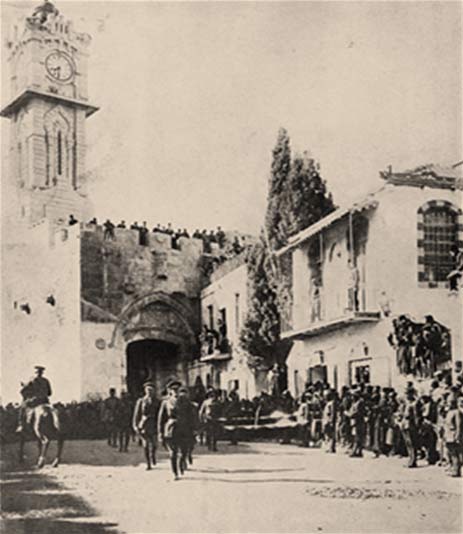
Proclamation of Martial Law by General Allenby:
“The defeat inflicted upon the Turks by the troops under my command has resulted in the occupation of your city by my forces. I, therefore, here now proclaim it to be under martial law”
The Balfour Declaration
The Balfour Declaration of 1917 (dated 2 November 1917) was a letter from the British Foreign Secretary Arthur James Balfour to Baron Rothschild, a leader of the British Jewish community, for transmission to the Zionist Federation of Great Britain and Ireland.
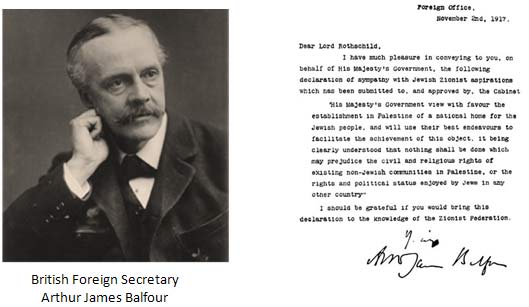
“His Majesty’s government view with favour the establishment in Palestine of a national home for the Jewish people, and will use their best endeavours to facilitate the achievement of this object, it being clearly understood that nothing shall be done which may prejudice the civil and religious rights of existing non-Jewish communities in Palestine, or the rights and political status enjoyed by Jews in any other country.”
~ Arthur James Balfour
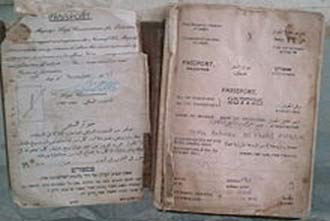 The biographical page of a passport from the British Mandate era
The biographical page of a passport from the British Mandate era
During the Mandate, the Yishuv or Jewish community in Palestine, grew from one-sixth to almost one-third of the population. According to official records, 367,845 Jews and 33,304 non-Jews immigrated legally between 1920 and 1945. It was estimated that another 50–60,000 Jews and a small number of non-Jews immigrated illegally during this period. Jewish immigration (mostly from Europe) to Palestine began to increase markedly, creating much Arab resentment. The British government placed limitations on Jewish immigration to Palestine.
British Mandate for Palestine
 The British Mandate for Palestine, was a legal commission for the administration of Palestine, the draft of which was formally confirmed by the Council of the League of Nations on 24 July 1922 and which came into effect on 26 September 1923.
The British Mandate for Palestine, was a legal commission for the administration of Palestine, the draft of which was formally confirmed by the Council of the League of Nations on 24 July 1922 and which came into effect on 26 September 1923.
The preamble of the mandate declared:
“Whereas the Principal Allied Powers have also agreed that the Mandatory should be responsible for putting into effect the declaration originally made on November 2nd, 1917, by the Government of His Britannic Majesty, and adopted by the said Powers, in favour of the establishment in Palestine of a national home for the Jewish people, it being clearly understood that nothing should be done which might prejudice the civil and religious rights of existing non-Jewish communities in Palestine, or the rights and political status enjoyed by Jews in any other country.”
Jewish refugees come home
Israeli Declaration of Independence
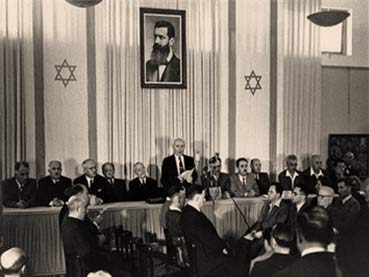
The Israeli Declaration of Independence made on 14 May 1948 (5 Iyar 5708), the day before the British Mandate was due to expire, was the announcement by David Ben-Gurion, the Executive Head of the World Zionist Organization and chairman of the Jewish Agency for Palestine, that the new Jewish state named the State of Israel had been formally established in parts of what was known as the British Mandate of Palestine and on land where, in antiquity, the Kingdoms of Israel and Judah had once been.

Coat of Alms of Israel
The Law of Return
The Law of Return is Israeli legislation, passed on 5 July 1950, that gives Jews the right of return and settlement in Israel and gain citizenship.
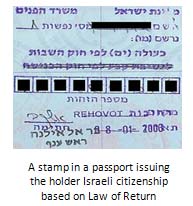 The Law of Return declares the right of Jews to come to Israel, claimed to be their ancestral homeland, and to facilitate their immigration. The Law stated: “Every Jew has the right to come to this country as an oleh.” An oleh is someone who makes Aliyah (it is a Hebrew word that means ascent or going up). According to Jewish tradition, traveling to the Land of Israel is an ascent, both geographically and metaphysically. Any Jew traveling to Eretz Israel from other countries where many Jews lived in early times, climbed to a higher altitude.
The Law of Return declares the right of Jews to come to Israel, claimed to be their ancestral homeland, and to facilitate their immigration. The Law stated: “Every Jew has the right to come to this country as an oleh.” An oleh is someone who makes Aliyah (it is a Hebrew word that means ascent or going up). According to Jewish tradition, traveling to the Land of Israel is an ascent, both geographically and metaphysically. Any Jew traveling to Eretz Israel from other countries where many Jews lived in early times, climbed to a higher altitude.
Return to the Land of Israel is a recurring theme in Jewish prayers recited every day, three times a day and traditionally conclude with the words “Next year in Jerusalem.” aliyah (returning to Israel) has both a secular and a religious significance. In all historical periods during which return to the land of Israel was possible, Jewish groups and individuals have immigrated back to the Jewish homeland. This is a direct fulfillment of Biblical prophecy:
“I will bring you from the nations and gather you from the countries where you have been scattered — with a mighty hand and an outstretched arm and with outpoured wrath.” – Ezekiel 20:34.
“In that day the Lord will reach out his hand a second time to reclaim the remnant that is left of his people from Assyria, from Lower Egypt, from Upper Egypt, from Cush, from Elam, from Babylonia, from Hamath and from the islands of the sea. He will raise a banner for the nations and gather the exiles of Israel; he will assemble the scattered people of Judah from the four quarters of the earth.” – Isaiah 11:11-12
Acknowledgements: References
